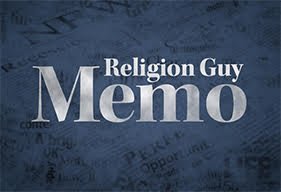Here’s new secular social science research that’s drenched with religious significance just waiting for examination by journalists.
Over the years, a substantial body of evidence from blue-ribbon universities and medical schools has demonstrated the physical and psychological benefits of regular religious involvement. A January Guy Memo here at GetReligion featured one such new study and then there’s that pioneering Mayo Clinic report from 2001 (.pdf here).
Note to journalists: The impact on life outcomes of youths who are raised in religious homes is especially striking.
Consider the 2019 book “Compassionomics: The Revolutionary Scientific Evidence That Caring Makes a Difference” by physicians Anthony Mazzarelli and Stephen Trzeciak, who are administrators and researchers at New Jersey’s Cooper University Health Care and Cooper Medical School. They reported evidence that health care staffers’ compassion toward patients has a powerful impact on improving both patient outcomes and the workers’ own well-being.
No kidding.
A new book by the same co-authors, going on sale June 21, dramatically extends the concept: “Wonder Drug: 7 Scientifically Proven Ways That Serving Others is the Best Medicine for Yourself” (St. Martin’s Essentials; contact publicity@stmartins.com). The Guy has not read the book but the news potential is obvious from a CNN interview with Mazzarelli last Saturday (click here for transcript).
Think of it as doing well by doing good.
From biblical times to the present, people have been urged to be helpful to others because (1) your Creator requires it and (2) it’s the right thing to do. The two clinicians tell us that a consistent commitment to helping other people is great for you in all kinds of medically provable ways and is thus the “wonder drug” of their title.
There’s a catch. Like the old joke about politicians learning to fake sincerity, the plan works only if it’s unselfish altruism, as opposed to performing deeds in order to make yourself look good or hoping to get something in return. “The more you mean it, the better the benefit,” says Mazzarelli.
The Publishers Weekly review said “this well-documented survey makes a persuasive case for a counterintuitive argument.”
Meaning what? As CNN’s host Michael Smerconish put it, current orthodoxy in the widespread “self-help” industry teaches people to “focus on themselves” not others. Reporters will want to run all this past some religion scholars and parish clergy.
The authors build their case from clinical anecdotes, survey research, neuroscience and impact on the “fantastic four” chemicals praised by pharmacology. Among the beneficial results they claim are better over-all health, energy, resilience, happiness, career success, and even higher incomes, along with less burnout, depression and anxiety. All that comes for free and, they boast, “no harmful side effects.”
On the practical side, Mazzarelli encourages those interested that “it’s not so hard to train yourself to care.” Simply have yourself think differently, build habits, and look for opportunities to help. You don’t even need a major commitment to, say, substantial volunteer work at a local charity. “Sixteen minutes a day makes a difference,” he says.
Smerconish: “Sounds too good to be true.”
Mazzarelli: “It is absolutely true. The science shows it.”
Given recent American sorrows, The Guy can’t help but think how much healthier teen-age boys would be if they emulated, for instance, the Ramapo High School students who volunteer at his retirement residence to teach seniors how to manipulate the gizmos of our tech age.
FIRST IMAGE: Feature photo at the website of the Translational Research Institute on Pain in Later Life.


